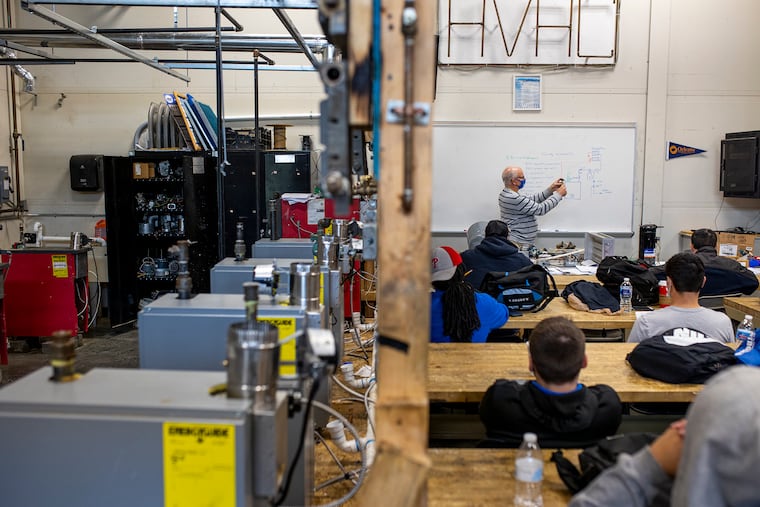How to become an HVAC technician
Here are some resources for those considering an HVAC career.

Becoming a highly skilled HVAC technician can take more than five years. The training has many pathways, starting with specialized high schools.
In Pennsylvania, there are more than 50 state-approved secondary school programs in HVAC. Typically, students, who pay no tuition, spend half their school days in regular classrooms and half at a technical school.
After high school, people who want to join the HVAC industry traditionally enter an apprenticeship program run by an HVAC company, union, or trade association. Company apprenticeships can be found by looking at job-search websites. In Southeastern Pennsylvania, the UA Steamfitters Local 420 and the nonunion Associated Builders and Contractors Eastern Pennsylvania offer apprentice programs with fairly stringent entry requirements — Local 420′s math test is famously difficult.
The local’s program lasts five years and charges no tuition. The ABC course runs four years with an annual tuition of $3,300, which is almost always paid by the apprentice’s employer. Both these training programs combine paid on-the-job experience with classroom teaching. They also veer toward the commercial, as opposed to the residential side of HVAC. A commercially oriented HVAC technician might, for instance, install a refrigeration system in a supermarket, while a residential HVAC might, say, go to someone’s home to fix an air conditioner.
Lately, a new step has been added to the training process. Increasingly, apprenticeship programs show a preference for candidates who have completed some post-secondary training that combines classwork and hands-on work.
“It is nice to take on a student that has some experience, but not required,” said Amanda Strzempek, executive vice president and chief operating officer for the Eastern Pennsylvania chapter of ABC. At a minimum, the most desirable apprentice applicants have passed two exams: EPA 608, which deals with refrigerants, and OSHA 10, which requires an additional 10-hour course on job safety.
Postsecondary training is available at:
Technical career centers
Many of these public schools offer continuing-education programs to adults. For instance, the North Montco Technical Career Center in Lansdale has an HVAC training regimen that provides classes two evenings a week for two semesters, at $1,000 a semester.
Community colleges
The Community College of Philadelphia offers a six-month training program to achieve HVAC level 1. For in-state residents, the tuition comes to $2,599. At Mercer County Community College in West Windsor, N.J., students can spend one year earning a certificate of proficiency or two years for an associate’s degree in applied science. For in-county residents, tuition for the one-year program is about $5,866; for the two-year, it’s about $11,733.
Nonprofit schools
Orleans Technical College, which is affiliated with JEVS Human Services, provides a six-month full-time or 13-month evening program for HVAC training. Located in Northeast Philadelphia, the nonprofit’s program costs $16,415.
Four-year schools
Students at Pennsylvania College of Technology’s Williamsport campus can study for either an associate’s or a bachelor of science degree. For in-state residents, the school, which is associated with Penn State, charges about $35,280 for the two-year A.A.S. or $66,024 for the four-year B.S. program.
The Future of Work is produced with support from the William Penn Foundation and the Lenfest Institute for Journalism. Editorial content is created independently of the project’s donors.